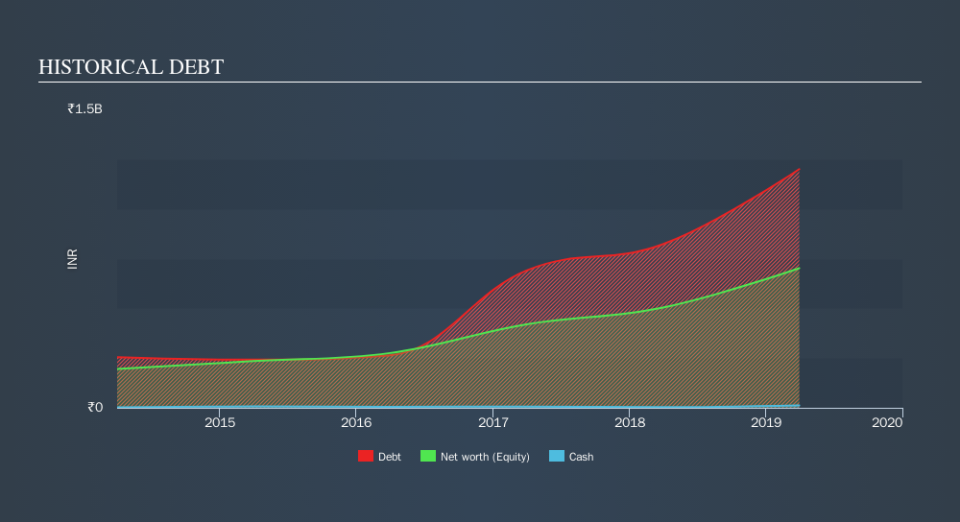Here's Why Neogen Chemicals (NSE:NEOGEN) Can Manage Its Debt Responsibly

The external fund manager backed by Berkshire Hathaway's Charlie Munger, Li Lu, makes no bones about it when he says 'The biggest investment risk is not the volatility of prices, but whether you will suffer a permanent loss of capital. It's only natural to consider a company's balance sheet when you examine how risky it is, since debt is often involved when a business collapses. We note that Neogen Chemicals Limited (NSE:NEOGEN) does have debt on its balance sheet. But should shareholders be worried about its use of debt?
What Risk Does Debt Bring?
Generally speaking, debt only becomes a real problem when a company can't easily pay it off, either by raising capital or with its own cash flow. In the worst case scenario, a company can go bankrupt if it cannot pay its creditors. While that is not too common, we often do see indebted companies permanently diluting shareholders because lenders force them to raise capital at a distressed price. Of course, plenty of companies use debt to fund growth, without any negative consequences. When we think about a company's use of debt, we first look at cash and debt together.
See our latest analysis for Neogen Chemicals
How Much Debt Does Neogen Chemicals Carry?
The image below, which you can click on for greater detail, shows that at March 2019 Neogen Chemicals had debt of ₹1.20b, up from ₹822.1m in one year. And it doesn't have much cash, so its net debt is about the same.
How Strong Is Neogen Chemicals's Balance Sheet?
We can see from the most recent balance sheet that Neogen Chemicals had liabilities of ₹1.17b falling due within a year, and liabilities of ₹595.0m due beyond that. Offsetting these obligations, it had cash of ₹11.7m as well as receivables valued at ₹611.0m due within 12 months. So it has liabilities totalling ₹1.14b more than its cash and near-term receivables, combined.
Given Neogen Chemicals has a market capitalization of ₹8.32b, it's hard to believe these liabilities pose much threat. Having said that, it's clear that we should continue to monitor its balance sheet, lest it change for the worse.
In order to size up a company's debt relative to its earnings, we calculate its net debt divided by its earnings before interest, tax, depreciation, and amortization (EBITDA) and its earnings before interest and tax (EBIT) divided by its interest expense (its interest cover). The advantage of this approach is that we take into account both the absolute quantum of debt (with net debt to EBITDA) and the actual interest expenses associated with that debt (with its interest cover ratio).
Neogen Chemicals's debt is 2.7 times its EBITDA, and its EBIT cover its interest expense 3.6 times over. This suggests that while the debt levels are significant, we'd stop short of calling them problematic. The good news is that Neogen Chemicals grew its EBIT a smooth 50% over the last twelve months. Like the milk of human kindness that sort of growth increases resilience, making the company more capable of managing debt. There's no doubt that we learn most about debt from the balance sheet. But it is Neogen Chemicals's earnings that will influence how the balance sheet holds up in the future. So when considering debt, it's definitely worth looking at the earnings trend. Click here for an interactive snapshot.
But our final consideration is also important, because a company cannot pay debt with paper profits; it needs cold hard cash. So we always check how much of that EBIT is translated into free cash flow. Over the last three years, Neogen Chemicals saw substantial negative free cash flow, in total. While investors are no doubt expecting a reversal of that situation in due course, it clearly does mean its use of debt is more risky.
Our View
Neogen Chemicals's conversion of EBIT to free cash flow was a real negative on this analysis, although the other factors we considered were considerably better There's no doubt that its ability to grow its EBIT is pretty flash. When we consider all the factors mentioned above, we do feel a bit cautious about Neogen Chemicals's use of debt. While we appreciate debt can enhance returns on equity, we'd suggest that shareholders keep close watch on its debt levels, lest they increase. Over time, share prices tend to follow earnings per share, so if you're interested in Neogen Chemicals, you may well want to click here to check an interactive graph of its earnings per share history.
If, after all that, you're more interested in a fast growing company with a rock-solid balance sheet, then check out our list of net cash growth stocks without delay.
We aim to bring you long-term focused research analysis driven by fundamental data. Note that our analysis may not factor in the latest price-sensitive company announcements or qualitative material.
If you spot an error that warrants correction, please contact the editor at editorial-team@simplywallst.com. This article by Simply Wall St is general in nature. It does not constitute a recommendation to buy or sell any stock, and does not take account of your objectives, or your financial situation. Simply Wall St has no position in the stocks mentioned. Thank you for reading.


